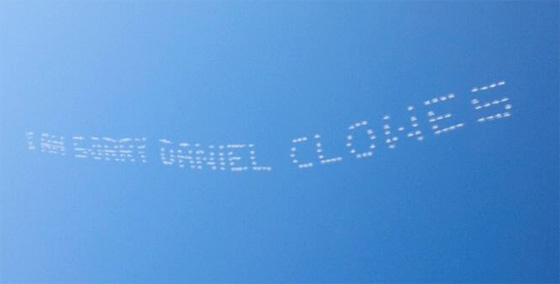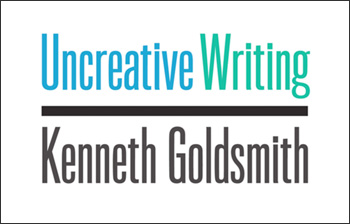| « There's No Shame in Going to the Encyclopedia Show | First Up at the Cliff Dwellers Book Club: The Cliff-Dwellers » |
Poetry Tue Jan 21 2014
Now Shia LaBeouf is Plagiarizing Kenneth Goldsmith (UPDATED)
Over the past month, Shia LaBeouf has taken plagiarism (and public infamy) to new heights.
Since the 2012 short film he directed, Howard Cantour.com, was revealed to be a rip off of a comic called Justin M. Damiano by Chicago-born graphic novelist Daniel Clowes, LaBeouf has tweeted numerous apologies and justifications, quoting everyone from Yahoo! commenters to Kanye West, Eliot Spitzer and Toronto Mayor Rob Ford -- all without attribution.
In addition, LaBeouf has mockingly re-posted a cease and desist letter from Clowes' attorneys after he tweeted a purported storyboard based on another Clowes work, publicly feuded with Jim Carrey and Jenny McCarthy, hired a plane to write "I AM SORRY DANIEL CLOWES" above the L.A. sky, and declared himself a performance artist...just days after declaring he would be retiring from public life and headbutting a man in a London pub.

Yesterday, The New Inquiry posted an essay with LaBeouf's byline called #stopcreating, exploring the recent history of artistic re-appropriation and the merits of long-held notions of authorship and originality in the digital age.
The prose and reference points may seem impressive for a man better known for Transformers and the Disney Channel. But if you look closer, #stopcreating is perhaps LaBeouf's boldest act of defiant plagiarism to date.
The sources? The words of poet and literary critic Kenneth Goldsmith -- including some that may have originally appeared on the website of Chicago's very own Poetry Foundation.
Primarily known as a poet, a conceptual artist, and an avant garde archivist through his website, UbuWeb, Goldsmith has published 10 books of poetry, teaches writing at the University of Pennsylvania, and last year became the Museum of Modern Art's first poet laureate. Nearly three years ago, he even led a high school poetry workshop at the White House with Michelle Obama.
A major theme throughout Goldsmith's work is that poetry can emerge from cataloging what already exists, and his published works include documentations of every word that came out of his mouth for a week, a rewriting of the entire September 1, 2000 issue of the New York Times, and transcripts of television and radio broadcasts. He even teaches a course called Uncreative Writing (and published a book in 2011 by the same name) in which he encourages students to steal from pre-existing works and be as unoriginal as possible, but defend the specific curation decisions they make during classroom discussions.
So if there's any individual qualified to comment on -- and perhaps justify -- the artistic merit of conscious plagiarism in the internet age, it would be the man who made his name in literary and intellectual circles doing just that.
At least that's what LaBeouf thought.
In an email interview with Bleeding Cool, he defended himself with several unattributed quotes, including a couple lifted from Goldsmith, like "It's not plagiarism in the digital age -- it's repurposing."
Goldsmith, however, was less than impressed with his newest fan. In a Jan. 8 interview with Nailed, he expressed his pleasure as seeing the actor's plagiarism scandals starting a broader cultural conversation, but noted, "Anyone who has worked with shared and borrowed materials for a long time knows that there is a certain degree of craft involved, something LaBeouf has no clue about."
And perhaps LaBeouf doesn't care, either.
 Copy nearly any section of "#stopcreating" into a Google search, and you will find a paragraph from the introduction to Uncreative Writing: Managing Language in the Digital Age (Fittingly enough, available for free on Google Books).*
Copy nearly any section of "#stopcreating" into a Google search, and you will find a paragraph from the introduction to Uncreative Writing: Managing Language in the Digital Age (Fittingly enough, available for free on Google Books).*
Interestingly, a couple of the paragraphs LeBeouf lifted from Uncreative Writing had previously appeared a year before in Goldsmith's posts on The Poetry Foundation's own Harriet poetry blog.
A twice-quoted paragraph starting with, "There's been an explosion of writers employing strategies of copying and appropriation over the past few years with the computer encouraging writers to mimic its workings," appears in an April 30, 2010 post titled Retyping an entire book is one thing. Cutting & pasting an entire book is another.
Furthermore, four paragraphs starting with, "Recently after I finished giving a lecture at an Ivy League university, an elderly, well-known poet stood up in the back of the auditorium and, wagging his finger at me, accused me of nihilism and of robbing poetry of its joy," also appeared under the title The Challenges of Twenty-First Century Writing on Harriet on April 16, 2010.
However, self-plagiarism is nothing new for Goldsmith. Some of the same parts of Uncreative Writing that LaBeouf copied appear verbatim in Goldsmith's September 2011 essay in The Chronicle of Higher Education [PDF]. Nearly all of his answers in his Feb. 2013 interview with The Awl had appeared in previously published works, including -- by his own acknowledgement -- the Poetry Foundation blog.
And as he notes in the acknowledgements section of Uncreative Writing, "Several of the essays in this book were inspired by pieces initially commissioned by the Poetry Foundation, where they appeared as a weeklong journal on their site on January 2007; other ideas were developed on their blog Harriet."
How much of Uncreative Writing initially appeared verbatim on the Foundation's wesbite (and subsequently appeared in publications, lectures and online pieces) is worth asking, particularly now that Goldsmith gets published in the New Yorker only a year-and-a-half after disgraced former contributor Jonah Lehrer was found to have plagiarized himself and others in his articles.
In a way, it's fitting that a controversy starting with the plagiarism of a work about a cultural critic by a Chicago-affiliated author has resorted to philosophical justification from the words of a cultural critic who copied entire paragraphs he either originally wrote for a Chicago-based poetry organization, or had used previously in other contexts.
More specifically, LeBeouf and The New Inquiry have willingly republished a selective plagiarism proponent's material in a way likely to be covered by the Terms of Use in places that originally published some or all the cited words.
Meanwhile, by publishing LaBeouf's copy-and-pasting of Goldsmith's own words, The New Inquiry has, at the very least, achieved the closest thing there is avant garde literary internet trolling.
As Goldsmith has previously offered a sort of "crafting of multiple works" criteria for justifiable plagiarism in the creative fields, one might argue that LaBeouf's plagiarism fails this subjective test and is simply a glorified version of tweeting a public figure's apology without attribution.
But regardless of whether LaBeouf truly believes in his #stopcreating philosophy of appropriating pre-arranged words and art, Goldsmith has unwittingly given intellectual ammunition to an already controversial celebrity refusing to cede the last word to his critics -- regardless of whether or not he has any original words to say.
While this situation may make for some novel entertainment value, it does nothing for the 99.99% of writers who lack the luxury of publicity or immunity from theft.
As Ruth Graham points out in a recent essay published on the Poetry Foundation's website, the poetry world itself was rocked last year with several plagiarism scandals involving poems that were slightly rewritten or partially "sampled" from previously-published works. Yet the last century-and-a-half of poetry is filled with examples of the same behavior (as Goldsmith himself might even point out).
She concludes by writing, "Plagiarism isn't a crime, there's no universally accepted punishment for it, and the perfect expression of contrition may never come."
Luckily for LaBeouf, that quote is only 133 characters.
UPDATE 1/25/14:
As pointed out in the comments, Uncreative Writing is not available for free -- it can be purchased as an eBook from Google Play in the link above for $13.79.
Since this piece went up, numerous outlets have reported on deleted tweets where Shia LaBeouf described his recent behavior as performance art in two separate manifestos.
According to Sean O'Neal of The AV Club, one of them quotes French Post-Impressionist artist Paul Gauguin and plagiarizes from 1972 New York Art scene documentary Painters Painting (which may or may not be available to view on a previously-mentioned website), while the other copies parts of performance art manifestos from Marilyn Arsem, Scotch Wichmann, and Marina Abramovic -- herself no stranger to American celebrities dabbling in the performance art world through her James Franco, Jay-Z, and Lady Gaga collaborations.
Interestingly, one of LaBeouf's manifestos named Kenneth Goldsmith as a collaborator, which he seemed to confirm on Twitter:
My pal Shia explains our recent collaboration: http://t.co/c8H8AfqKgM (via @thecampaignbook)
— Kenneth Goldsmith (@kg_ubu) January 22, 2014
Most outlets reported that the deleted manifestos first went up on Monday night, but Gossip Cop (of all places) first reported them last Saturday. Whether the TNI essay was intended to replace or supplement these tweets remains unknown. As suggested to me by a couple TNI readers, the #stopcreating essay could have been assembled by Goldsmith himself.
Neither LaBeouf or Goldsmith responded on Twitter when I asked when their mutually-acknowledged collaboration began. When reached by email, The Poetry Foundation also declined to comment on the situation.
However, Goldsmith's most recent comment about #stopcreating came this morning:
Pointing at the best information trumps creating the best information. #stopcreating
— Kenneth Goldsmith (@kg_ubu) January 25, 2014Whether or not LaBeouf truly succeeded in provoking a discussion about plagiarism with lasting ripple effects remains to be seen. The news cycle has moved on to comparing his behavior to either Joaquin Phoenix or Justin Bieber, and his upcoming role in Nymphomaniac is likely to overshadow what most people will remember as an odd publicity stunt in a popular actor's history of notorious behavior.
Despite his recent repeated "I AM NOT FAMOUS ANYMORE" Twitter refrain, Shia LaBeouf will be in the public eye for the foreseeable future.
Whether anyone will want to listen to him, however, is a different question.










Nathan Smith / January 24, 2014 8:58 AM
That Kenneth Goldsmith doesn't sem to be up for free, it says it costs £12.28 to buy the eBook?